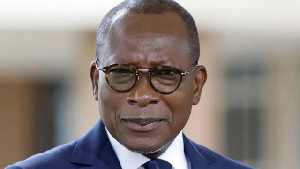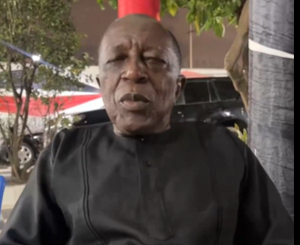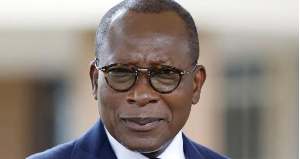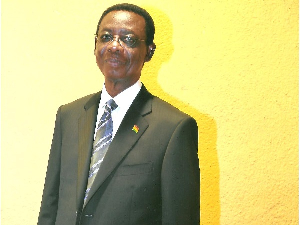It was around noon on Friday, August 20,1943 and crowds of people had gathered at the gates of Korle Bu Hospital.
The state of the Okyenhene’s health had become the subject of rumours in Accra. At his bedside were the Odikro of Apapam, Okyenhenekyeame, Kwame Asare and Nene Nuer Ologo of Yilo Krobo.
On Wednesday, August 4, 1943, Nana left Kyebi late in the evening and arrived at Dodowa the next morning, August 5, to attend a session of the Provincial Council of Chiefs at the Guggisberg Memorial Hall.
On Friday August 6, he left for Accra to spend the weekend. He returned to Kyebi on Monday, August 9 with a slight cold that soon developed into a cough.
He stayed indoors on Thursday, August 12. That same Thursday, he booked an appointment by telephone to see Dr A.M. Mac Rae of the Gold Coast Hospital at 10 a.m. on Tuesday, August 17. Nana was conspicuous by his absence at the sitting of the Legislative Council on the same day. His personal secretary, Geo. Akuffo Dampare, recounted the the sombre mood that pervaded the Council Chamber at the announcement of his illness. That was the first and the last official announcement concerning the illness.
At 3.35 p.m., in the presence of the Odikro of Apapam, Okyeame Kwame Asare and Nene Nuer Ologo, Nana Ofori Atta breathed his last at the Korle Bu Hospital in Accra, seven weeks short of his 62nd birthday.
Early Life
Nana Ofori Atta was born on October 11, 1881. He was named Kwadwo Fredua Agyeman and later christened Aaron Emmanuel Boakye Danquah. His mother was Akosua Buo Gyankromaa, daughter of Afriyie Akoto - the youngest of Ohemaa Dokuaa’s three daughters. His father was Emmanuel Yaw of Begoro-Akim-Abuakwa.
Education and work
Nana Ofori Atta was educated at the Basel Mission Elementary School at Tosen (Anum) between 1888 and 1893. His father had assumed duty there in 1886 after his ordeal at Asuom. Kwadwo Fredua Agyeman continued his primary school education at Kyebi and Abetifi.
In 1894, he was admitted to Begoro Basel Mission Grammar Boarding school (the equivalent of today’s SHS) and became the pride of the school. Young Aaron Emmanuel Boakye Danquah (A.E.B. Danquah) was admitted to the Theological Seminary at Akropong Akuapem in 1898, preparatory to a possible, fuller course in Theology in Germany.
He qualified as a “Certificated Teacher” in 1897, but realised he was not cut out for a career in ministry. And by age 18, he had taken up the post of a Solicitor’s Clerk at the office of Lawyer Hutton Mills with the intention of picking up the “elementary principles of the law before proceeding to England to study for the bar.
A.E.B. Danquah left Hutton Mills’s office in 1900 to work at the Correspondence Branch of H.M Customs. Serving as a sergeant in the Gold Coast Volunteer Corps at the start of the Yaa Asantewaa War (1900-01), he accompanied Captain Wilcox as a Non- Commissioned Officer.
He obtained employment at the Office of Governor Nathan at the end of the war and accompanied him as his interpreter during his tour of Cape Coast and Sekondi.
After that, he worked briefly with Goldfields of Eastern Akim in 1902 and later with Obuasi Mines in 1903, before joining his sibling, Alexander Eugene Apea Danquah, to work as Joint-Secretary to their Uncle, Okyenhene Amoako Atta II.
Apea Danquah died in 1907, leaving his younger brother as sole secretary. And by 1909, A. E. B. Danquah was being widely touted as “the brain behind the Omanhene’s throne”.
Little wonder that the kingmakers unanimously approved of his nomination and election to succeed Nana Amoako Atta III (Kwaku Sreko), who was destooled on November 26, 1912, after a short reign of twenty-one months.
The new Omanhene adopted the stool (throne) name of Ofori Atta, a name cleverly contrived to honour and perpetuate the memory of Akyem Abuakwa’s two foremost heroes: Nana Ofori Panin who re- established the state as a leading power on the banks of River Birim in the late 17th century; and Nana Amoako Atta I, whose dogged resistance to colonial penetration of Akyem Abuakwa led to his five-year exile in Lagos and eventually to his death in detention on February 2, 1887 in a British prison in Accra.
Challenges at his Ascension
Ofori Atta I was confronted by daunting challenges at his ascension on November 27, 1912. First, the authority of Okyenhene was at its lowest ebb. Nearly a decade before, in 1905, Okyenhene Amoako Atta I and his Council had petitioned the Governor for help for the growing insubordination of people in the district and cases of contempt and disobedience of elders and chiefs.
Second, the Basel Mission’s quest for land to build mission stations in the early 1850s and the subsequent Industrial Revolution triggered reckless alienation of stool lands in the third quarter of the 19th Century.
Until mid-19th Century, Akyemfuo had exploited their vast territory mainly for the production of gold, hunting and subsistence farming. A Dutch Report of 1701 described Akyem as one of the “three mightiest and richest countries from which practically all the gold has come ...”
The impact of this mad rush for Akyem lands was disastrous. Between 1824 and 1900 Akyem Abuakwa lost lands estimated at 400 sq. miles or 1036 sq. kilometres to migrant farming communities.
By the turn of the century, Krobo migrant farmers had bought 311 sq. km of Begoro stool lands beyond the Ponpon river that originally marked the boundary between Krobo and Akyem Abuakwa.
Okyenhene Amoako Atta II looked on helplessly as his immemorial customary rights in land were being extinguished. Like all other states in the Gold Coast at the time of Nana Ofori Atta’s enstoolment, Akyem Abuakwa was a backward state in the sense that no effort had been made to develop it.
There were no motorable roads, no telegraph, no telephone and Nsawam was the nearest railway station. Bicycles were the most advanced form of movement and few had them. There were few schools, and they, with one exception (at Begoro, founded in 1885), went up to Standard III only. There was no hospital. How did Ofori Atta deal with these hydra-headed problems and with what measure of success; and what legacy did he bequeath to the emergent Gold Coast nation?
These are some of the questions I shall attempt to answer in this presentation.
The stool lands question
By the time Ofori Atta ascended the Ofori Panin Stool in 1912, the reckless alienation of stool lands had reached alarming proportions. During his two-year occupancy of the Begoro Stool (1905 - 07), Benkumhene Gyamera had sold lands “to the value of hefty £3,000 (about Gh¢2.1 today, Sunday, May 27, 2018) and actually collected £1,732 of which his elders and people knew nothing about.”
His brother and successor, Kwaku Tupri, (1908-1913) sold £521.45 worth of stool land without the consent of his elders and appropriated it.
Nifahene Kwame Okoampa (1905-08) sold lands to a Dutchman J. Fuscher “giving no account what of the sale, contrary to native custom.” Ofori Atta’s immediate predecessor, Amoako Atta III is said to have received an unprecedented, total revenue of some £2,500 in his twenty-one month reign without utilising “any of this money to the advantage of the stool”.
Early in his reign, cases were brought to Ofori Atta’s attention in which chiefs had sold, or encouraged the sale of, large tracts of land without prior consultation with their elders and without account. More often than not, lands sold included farms cultivated by their own people. Akyemfuo had become so perverse that Ofori Atta wondered whether their generation was not destined to be “the last to live in this world”.
Abuakwa was at risk of a serious diminution in territory. Migrant farmers had not only denuded much of Abuakwa’s “primeval high forest”, which in 1893 was estimated at 80 per cent. In fact, the ruler of one of the neighbouring states, whose migrant subjects had bought an estimated 130 square kilometres of Abuakwa land, was insisting that the purchased lands be “cut off (in the map) from its original division’’ and included “in the Volta District as part of Krobo”.
Between 1824 and 1900, Abuakwa lost lands estimated at 400 sq. miles (1,036 sq. km) to migrant farming communities. These events, coupled with vast unworked concessions, had created a situation in which some citizens “had already begun to feel ... the pressure for land to cultivate ... or even to extend their existing farms”. Akyemfuo appeared to be about to lose their ranking as one of the largest landowners in the Gold Coast and become “a landless and beggarly people”.
Reforms in Stool Land Administration
Beginning from 1915, Nana Ofori Atta invoked all the powers available to him under customary law and usage, as well as the Native Jurisdiction Ordinance of 1883 to deal with the problem. The goals he set himself were threefold:
First, to define and assert, beyond question, the paramount stool’s rights and interests in stool lands.
Second, to provide financial security for his sub-chiefs and thereby restore their lost dignity and legitimacy as traditional leaders.
Third, to establish a culture of accountability and responsibility in the use of state resources for national development, by personal example, and by the institution of appropriate sanctions.
Assertion of interests
On January 27, 1915, Nana Ofori Atta successfully persuaded his chiefs at an Okyeman Council meeting to resolve unanimously to reserve the remaining lands that had not yet been alienated for future generations.
Subsequent to the resolution, he placed an advertisement in local newspapers banning further land sales and warning prospective buyers of land about the risk they took buying land “in any shape or form” in his state.
To regulate land sales, he devised forms titled: “Conditions of sale of lands in Eastern Akim”. The forms imposed certain obligations on prospective buyers and made any land sale subject to the Okyenhene’s approval. Citizens were barred from selling or pledging their cocoa farms as security for any purpose whatsoever, without the prior approval of the Okyenhene and the sub-chief directly in charge of the land in question.
In 1918, Nana Ofori Atta moved a step further to have the Okyeman Council pass a special bye-law to assert and enforce the paramount stool’s rights as chief landlord.
Except for migrant farmers with properly executed agreements, all non-Abuakwa citizens were required to pay an annual rent of £1.00 (eqivalent to about GH¢340) for farms planted with permanent crops—cocoa, rubber, kola, among others, while half that amount was to be paid for farms planted with moveable crops such as corn, cocoyams ..
Secession
The second challenge from Asamankesehene Kwaku Amoah was more protracted and intractable. On June 27, 1921, his lawyer, Hutton Mills, wrote to Okyenhene on the instructions of his client, to announce the secession of his town and its satellite Akwatia, from the Akyem Abuakwa State. Three months later, on October 7, 1921, Nana Kwaku Amoah petitioned the Acting Governor for leave to withdraw allegiance to the paramount stool. Following the rejection of that petition, Kwaku Amoah resorted to litigation in the British courts.
For 17 years the case travelled through the hierarchy of courts—from the Magistrate’s court, High Court to the Privy Council and back to the Magistrate’s court.
In order to stop the prolongation of the dispute and the wasteful expenditure of public funds entailed, the government passed the Asamankese District Regulation Ordinance to restrict Asamankese’s access to its bank account. The ordinance was meant to deny Asamankese the use of funds accruing from rents, land sales and mining royalties for payment of legal fees. The rebel towns yielded to persuasion by Acting Secretary of Native Affairs, H.W. Thomas, and in June 1929, submitted their case to Justice Roger for arbitration.
Mining
Ofori Atta’s next target was the mining industry, which operated to the disadvantage of the Akyem Abuakwa State. As a result of the discovery of diamonds near Abomosu in 1919, the state experienced a rush for mining concessions. Within 10 years of Ofori Atta’s reign, the number of concessions in the state rose to 57-made up of 29 for gold, 24 for diamond and four mixed. Only four out of the estimated 47 mining concessions were active in 1928 and no rent was being paid in several cases.
In others, the rents were allowed to fall into arrears for several months before being paid “when an outside claim or other circumstances [arose] to increase the value of the land”.
Ofori Atta set to work to retrieve Abuakwa lands that had been tied under concessions and make them available for agriculture. He insisted on the payment of fair rent, and sought amendment of the law to set a limit on the duration of options. On his instructions, his lawyer, Thomas Hutton Mills, issued a public notice declaring several concessions null and void for “non-payment of occupation rents”.
Education
The Okyenhene’s faith in education as a tool for progress was clearly articulated in a memorandum that he sent to the Presbyterian Synod meeting at Kyebi on July 11, 1941, barely two years before his death. He wrote: “I do and shall always emphasise that education should be regarded as one of the foremost duties of the chiefs towards the community; and any chief who fails or neglects his duty can hardly be deemed worthy of his trust.
Four years into his reign (1916), Ofori Atta backed the formation of the Abuakwa Scholars’ Union.
The Abuakwa Scholars’ Union, of which J.B. Danquah was a member, proposed a levy of 10 per cent to be collected “on all proceeds from land alienation ... to be set apart for national needs”. The Okyeman Council enthusiastically adopted the proposal, albeit at a lower rate of five per cent. A bank account was opened in the name of Okyeman in 1920. The fund was not sustainable and soon lapsed.
As a member of the Legislative Council, the Okyenhene supported the 1925 Education Ordinance, a brain child of the Educationist Committee on which he served for five years. The Ordinance gave all schools the opportunity to qualify for financial assistance by meeting certain prescribed standards of efficiency.
Between them, the mission schools in Akyem Abuakwa received a total of £4,038.84. The payments intended for the defrayment of teachers’ salaries had the effect of encouraging the missions to open more first cycle schools in remote parts of the colony, in collaboration with the chiefs and their communities.
Female education occupied a lowly place on the Colonial Government’s scale of priorities, and Ofori Atta continually urged Guggisberg to pay attention to it. Though sympathetic, the governor could not oblige owing to a dearth of African female teachers. Consequently, female education continued to lag behind that of boys. By 1927, there was not a “single girl” in the state who had passed Standard VII.
At a durbar for Guggisberg at Kyebi, the Okyenhene described the neglect of female education as a “national disaster”. And at the sitting of the 1927- 28 Select Committee of the Legislative Council, he urged the government not to shirk its responsibility in the matter of female education.
Gold Coast Man
Among the 700-odd tributes received at Nana Ofori Atta’s funeral was one from a Mr E.A. Ammah. It read: “The Late Nana Sir Ofori Atta I identified himself not only with the affairs of his own state but also with the various activities of the Gold Coast. Indeed, Nana was great in many spheres of life ...”
Another from Jonnie Rubbs of the Spectator Daily said: “The late Nana Sir Ofori Atta was the Gold Coast man. His activities extended to every part of the country. He stood in the name of the country in many matters of grave importance affecting it ...”
These accolades were neither whimsical nor mere emotional outbursts. They were fully deserved. Ofori Atta served the Gold Coast at three levels of governance: local, provincial and national.
Repatriation of Prempeh I
One issue of national interest that engaged the attention of Nana Ofori Atta was the repatriation of Asantehene Nana Prempeh I from Seychelles island. Following his arrest in 1896, the Asantehene had been kept as a prisoner at the Elmina Castle until the outbreak of the Yaa Asantewa War in 1900 when he was moved to Sierra Leone and from there to the Seychelles Island, off the coast of South Africa, till 1924.
During the 1919-20 session of the Legislative Council, Okyenhene Ofori Atta moved a motion for the passage of a resolution to bring the Asantehene back home. Seconded by a Mr. Brown.
Though Governor Guggisberg commented favourably on the motion, he advised the Legislative Council that due to a recent change in the administration, the motion should be withdrawn for the present until a more opportune time. The motion was withdrawn. Some four years later, in 1924, Nana Prempeh was repatriated.
During his tour in connection with the N.A.O., Ofori Atta visited Kumase and was warmly received by Nana Prempeh I in appreciation of the role he played in his repatriation from Seychelles Island. Nana Prempeh I spent 23 years as an exile in Seychelles.
Cultural nationalist and modernist
Ofori Atta’s predecessors had resisted the Basel Mission’s attempt to use the Salem and the ‘school’ as tools for acculturation. While Nana Amoako Atta I favoured religious pluralism, the Basel Mission sought to promote monotheism. He could not allow it because of its politico-religious and social implications. He asked rhetorically: “Must I let my horn blowers, my drummers, my pipers ... my sword bearers and executioners become Christians? If I do, then I can no longer carry out my ... ceremonies, nor can I receive foreign embassies worthily. Whoever has an obligation to serve me will never be allowed to become Christian.”
The polarising effect of the Salems was very much in evidence by 1904. Atumfa Chief drew the attention of Rev. Nothwang to how the Salems had created “two towns out of each town” and caused “division among us who are brethren”.
Though he was born into a Christian family and raised as a Christian, Nana Ofori Atta was, as Okyenhene, conscious of the traditional, cultural underpinnings of Akan chieftaincy. He shared the view expressed in 1920 by Governor Guggisberg that Africans must be allowed to hold on to their culture.
“One of the greatest mistakes of the education in the past has been that it has taught the African to become a European instead of remaining an African. This is entirely wrong and the government recognises it. In the future, our education will aim at making the African remain an African, and taking interest in his own country,”Governor Guggisberg said
Ofori Atta defended the culture of his ancestors without ignoring aspects of other people’s culture that had the potential to enrich his own and make it progressive. He was prepared to support adaptations that were consistent with his conception of modernisation of Akyem Abuakwa and the Gold Coast. Thus, he did not object to a Basel Mission regulation of 1927 that mandated a two-thirds share of a deceased Christian husband’s estate to be given to his wife and children. P.N.D.C. law 111 may be regarded as a rehash of that regulation.
Ofori Atta was unalterably opposed to foreign cultural norms that threatened to de-Africanise his people and make them “carbon-copies of Europeans”. This was part of a memorandum on education, which saw him lead 15 paramount chiefs to present the issue to Governor Shenton Thomas in 1934. The memorandum stressed the importance of giving Gold Coast children education that took a number of fields into account: creativity, critical thinking, objectivity, as well as love of country.
Opinions of Friday, 24 August 2018
Columnist: Prof Robert Addo-Fening















